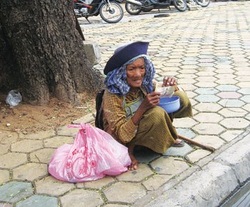
"There are people in the world so hungry, that God cannot appear to them except in the form of bread."
- Mahatma Gandhi
I was coming back from a trip to the Russian Market here in Phnom Penh, where I bought a few t-shirts as gifts. I was in the back of a tuk tuk and we stopped at a traffic light, jammed in with the other cars, motor scooters, tuk tuks, and vendors with bowed backs pulling handcarts filled with coconuts. Motorists fanned themselves and shooed away the barefoot little kids begging, a sad sight you just have to get used to everywhere in Cambodia. An old lady approached the side of my tuk tuk, hands outstretched. She had only a few nubs where her teeth used to be and her body was shriveled and blackened with sun and dirt, impossibly wrinkled under soiled rags. I shook my head, “no.”
That may sound cruel, but in Cambodia you have to pick and choose who you give money to. There are so many beggars and people working the streets that you couldn’t possibly give to everyone. Even at a dollar per person, you’d go broke by noon. In every alley there’s a family squatting and sifting through the trash. In every park there are street kids sleeping with the curb as a pillow. Along the river, dozens of teens huffing glue out of plastic bags to calm their hungry bellies. But the more time you spend here, you also can tell who’s the real deal. Little kids are often sent out on the street to beg by their parents or gangs, who will be around the corner drinking up the tourist’s money. Kids hustle, pickpocket, and run all sorts of scams. They’re kept filthy or scarred with lit cigarette butts to make the tourists more sympathetic. In the twisted stage drama of Third World streets, having a hideous deformity or being legless is actually a competitive advantage when it comes to begging.
However, many local Khmer (Cambodian) people tell me not to give on the street, at all. It just encourages more begging when they see it works. “A hand up, not a hand out,” they say. But I still give, though these days I can tell pretty well who needs it. But everyone who’s in country long enough, especially in the capital city, Phnom Penh, is forced to devise a policy of who they give to and who they don’t. Basically, you have to play God, deciding who is worthy of eating that day with your dollar. Sometimes they realize they’re doing it and even tell others their policy. Often times it’s mapped out unwittingly in their subconscious. It’s terrible, but it’s inescapable.
So when the old lady came up to me, I didn’t even look in her direction. I’d just given a dollar to a little disabled boy in a wheelchair in the market, and given more to local charitable causes in the last couple weeks than I’d spent on myself. Also, it’s not a good idea to take out your money at an intersection stuck in traffic, where you’re easy prey for someone who wants to grab it and then speed away on a motorcycle. So I shook my head, “no,” again to her and didn’t even look in that direction, hoping to assuage my guilt. But she pleaded again and put her fingers to her mouth, expressing that she was hungry and wanted to buy a meal, and once I caught her eyes, I couldn’t say no.
I looked around and then took out my wallet and opened it up. Just then, the light turned and the traffic around us roared to life. My tuk tuk driver kicked the engine to life. I thumbed through the bills in my wallet, feeling the urgency to find a one-dollar bill to give her. I got caught on a ten-dollar bill and leafed past it. The tuk tuk began to move and a look of panic overtook the old lady’s face. She took a few steps to keep pace with us, but could barely walk upright to begin with. I tried to grab at another bill but fumbled on the disorganized stack of one’s. The old woman cried out in desperation. A one-dollar tip, generous fare to give away on the street in poor Cambodia, might not seem like a lot, but a resourceful local person could eat for a day or more with that amount.
We sped up and it was apparent that I couldn’t get her the money behind, and she had no way to keep up with us. A thought flashed through my head to tell her to jump aboard, but she wasn’t Jackie Chan and of course she didn’t even speak English. Our tuk tuk crossed the intersection and I saw her five feet away, then ten, crossing through traffic in a desperate attempt to somehow get my dollar bill. The motos and cars zoomed around her, threatening to clip her if she didn’t get out of there fast. In Cambodia, pedestrians have no rights and someone gets hit and killed on the roads every day.
The police don’t give a shit and there’s no recourse, no court in the land that will try a case even if the driver was drunk or speeding the wrong way down a one-way street. It’s commonly known that if a rich person (the only ones driving cars, and certainly there are plenty of 100k Range Rovers,) hits and kills a pedestrian, they just toss $500 or so out the window, either restitution for the family or enough to appease the mob of witnesses, before rolling up their window and continuing on their way. I yelled to my tuk tuk driver but he couldn’t hear me so we picked up speed. I had to get her the dollar because that was a cruel twist to tease her with food for the day at her fingertips and then take it all away.
I finally grabbed a one-dollar bill and did the only think I could think of - I threw it at her, out the back of the tuk tuk.
It seemed like a terrible thing to do but there she was, wailing with arms outstretched in the middle of a busy intersection, traffic honking as polished fenders and wild came inches from slamming into her. Still, I couldn’t help but feel an obscenity of condemnation at the act; throwing money at a begging old lady in the middle of dangerous speeding traffic. I instantly wondered if those around me saw the whole thing progress or would just think I was terrible human being. I hoped they saw.

Instead of falling to the street behind me, it drifted up, sailed at eye level, fluttered, and landed right at her feet.
It seemed like it took forever. Her eyes tracked the bill and I was worried she would bolt in front of a car to get it, but she didn’t even have to take one step to reach it. It came to a graceful rest inches in front of her and she easily bent down to snatch it up before a tire ran it over. I was awestruck. I couldn’t have made that throw 1 time out of 1,000 with a Frisbee or a horseshoe, yet alone with an unfolded bill that was jettisoned from the back of a moving vehicle in desperation. The last thing I saw before we sped away was her holding folded hands to her forehead, the sign of thanks in Buddhist religion, or prayer, but I was certain she wasn’t thanking me.
I still had chills, replaying the scene over in my head, by the time we pulled up at my hotel. I hopped out and went to pay the driver. I opened my wallet and reached for that ten-dollar bill for him to break, but there were only one’s in there. Somehow, I’d thrown her the ten-dollar bill, even though I was certain it was a one at the time.
I was glad about that. Now, she could eat for a week.
-Norm :-)
 RSS Feed
RSS Feed